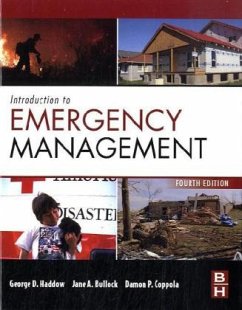Emergency management is a vibrant and growing field, driven by government spending in the wake of terrorist attacks and natural disasters and by private-sector hiring of risk managers and emergency planners. Practicing professionals need a book that provides a solid foundation in the principles of disaster planning, mitigation, response, communications, and recovery, and since 2003, Introduction to Emergency Management has led the market among introductory EM books. As climate change and development lead to more numerous and more costly disasters and as countries around the world continue to struggle with terrorism, the number of emergency managers and business continuity planners continues to rise. The private sector partners with local, state, and federal government to prepare for and recover from crises. This 4e gives still more focused, current, thoughtfully analyzed information on the all-hazards, all-actors approach to emergency management.
"Drawing heavily on recent case studies, this book examines emergency management as practiced in the United States at the federal level and by state and local agencies. The most recent disasters are covered, and up-to-date information on the role of emergency management agencies under the Obama administration is provided." --Foreign Service Journal, October 2011
"Contained within this monograph are details and descriptions of contemporary emergency management practices and strategies, as well as descriptions of the key players involved in emergency management both within the United States and around the world. The authors' intent is to provide the reader with a working knowledge of how the functions of comprehensive emergency management operate and the influence they can have on everyday life. New to the fourth edition are an expanded coverage of risk management and disaster communications, more material on mitigation of disasters, and current information on the role of FEMA in the Obama administration."-- MCEER.com
"In this beginner's guide to emergency management, Haddock, Bullock, and Coppola provide a well-rounded approach that fulfills the requirements of an introductory textbook. Their comments and assessments of the progress of emergency management lead the reader from early historical events-such as an 1803 New Hampshire fire-to some post-Katrina changes that affected national and local planning. The book reviews some of the history of the Federal Emergency Management Agency and its current organizational structure. This well referenced book is formatted to stimulate the reader to seek more information on this valuable subject and is a good starting point. The authors appear to be knowledgeable and experienced and have put together a well organized book."-- Security Management
"Contained within this monograph are details and descriptions of contemporary emergency management practices and strategies, as well as descriptions of the key players involved in emergency management both within the United States and around the world. The authors' intent is to provide the reader with a working knowledge of how the functions of comprehensive emergency management operate and the influence they can have on everyday life. New to the fourth edition are an expanded coverage of risk management and disaster communications, more material on mitigation of disasters, and current information on the role of FEMA in the Obama administration."-- MCEER.com
"In this beginner's guide to emergency management, Haddock, Bullock, and Coppola provide a well-rounded approach that fulfills the requirements of an introductory textbook. Their comments and assessments of the progress of emergency management lead the reader from early historical events-such as an 1803 New Hampshire fire-to some post-Katrina changes that affected national and local planning. The book reviews some of the history of the Federal Emergency Management Agency and its current organizational structure. This well referenced book is formatted to stimulate the reader to seek more information on this valuable subject and is a good starting point. The authors appear to be knowledgeable and experienced and have put together a well organized book."-- Security Management

